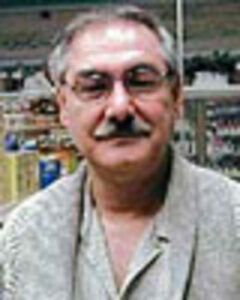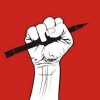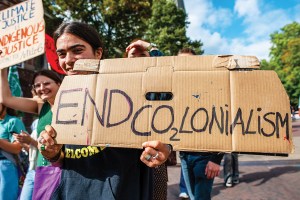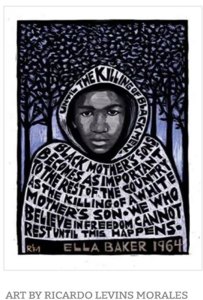What began in 2003 as Shock and Awe, a strategy of war based on terrifying an “enemy” country with the use of overwhelming military power, resulted in the subsequent madness of U.S. military operations in Fallujah.
 On the Anniversary for the Battle of Fallujah
On the Anniversary for the Battle of Fallujah
by Sami Rasouli Vol. 41 No. 1 Spring I 2023
Women Against Military Madness Newsletter
One of the most devastating impacts of the illegal war conducted by the United States against the people of Iraq occurred in the city of Fallujah.
What began in 2003 as Shock and Awe, a strategy of war based on terrifying an “enemy” country with the use of overwhelming military power, resulted in the subsequent madness of U.S. military operations in Fallujah. The first battle against the city took place on April 4, 2004, and lasted until May 1, 2004. A second battle for U.S. control of Fallujah was waged in November and December of that year.
Sami Rasouli will be speaking on “Iraq Today: Since 1991 32 years of war, sanctions, and occupation” on Wednesay, May 17, 2023 at 6:30 pm at St. Albert the Great Church, 3216 29th St, East, Minneapolis.
The weapons used in these battles caused afourfold increase ofcertain types of cancer in the general population of Fallujah, while the incidence of cancer in its children increased 12 times.
We have these statistics because of an important study conducted by the Iraqi Ministry of Health and defended by the World Health Organization. This study confirmed that the rate of cancer, mortality, and also congenital anomalies among newborns in Fallujah is even greater than what was recorded among the survivors of the atomic bombs in Hiroshima and Nagasaki. Further confirmation of these distressing issues has been reported by Iraqi and international physicians and toxicologists, published in renowned medical and scientific journals, and featured in media throughout the world, but not the U.S.
To this day, almost 20 years later, children in Fallujah are born with horrible, hideous, and deadly deformities. They are born without heads or eyes, and with exploding stomachsand incomplete organs.
The U.S. tested all kinds of explosive chemicals in Fallujah, such as thermal weapons, white phosphorus, and depleted uranium, as if the Iraqis were guinea pigs. Research confirms that unusual amounts of uranium and mercury are present in the roots of hair, important evidence linked to the use of weapons prohibited by international law.
In 2005, a Pentagon spokesmantold the BBC that white phosphorus was employed in the 2004 battle for Fallujah as an incendiary weapon against enemy combatants. (“Enemy combatants” is how the military described those trying to defend their city.) His inadvertent confession was soon denied by another Pentagon spokesman, who claimed that all the weapons that were used against Fallujah were legal.
What the Pentagon does not say is that white phosphorous caused severe burns forboth “combatants” and civilians in Fallujah, and maimed the children. The cycles of political lying about the horrific consequences of incendiary weapons continued, as did the lie with which the war began.
Now, after so many years have passed since the suffering in Fallujah began, one of the saddest things is the way the name “Fallujah” is being used. A U.S. Navy warship (an amphibious assault ship) has been named the USS Fallujah as a kind of brazen bragging. And youth can play an electronic video game called“Six Days in Fallujah”, acting as soldiers fighting “enemy combatants” for control of the city.
The stubborn questions remain: Will U.S. leadership ever compensate Fallujah and Iraq for the war crimes committed two decades ago? If so, how would that be possible?
The compensation I, the writer of this article, seek is for the leadership to address the culture of violence that permeates the U.S. so that, instead, schools are made safe places for children to attend,assault rifles aren’t available for disturbed people to mass murder others, all kinds of weapons (including projectiles with depleted uranium) are no longer supplied to fuel the war in Ukraine, and the U.S. stops using military force as its foreign policy.
Then we could have peace.
Sami Rasouli is an Iraqi and U.S. citizen and conducted peace advocacy in both countries before, during, and after the U.S. war on Iraq. Soon after the battles of Fallujah, he formed the Muslim Peacemaker Team in his home city of Najaf and traveled to Fallujah volunteering to do anything he could to help the residents struggling with the aftermath, including clean-up.
ACTION:
Gamers for Peace
A toxic mindset of problem-solving with violence is generated through digital games such as “Six Days in Fallujah.” These kinds of electronic spaces are used by military recruiters to entice youth to join the military and become part of the war machine. “Gamers for Peace” is an initiative of Veterans for Peace for counter recruitment through digital spaces. Find them at:
veteransforpeace.org/take-action/gamers-peace
#gamersforpeace#Veteransforpeace
Independent media is essential in these Rise Up Times. Your support makes Rise Up Times, Media for Justice and Peace possible. Please donate today.
Subscribe to Rise Up Times today. Donations of every amount are welcome.

 On the Anniversary for the Battle of Fallujah
On the Anniversary for the Battle of Fallujah 

